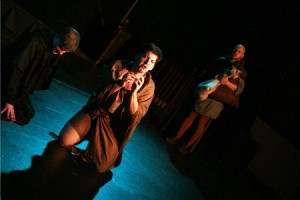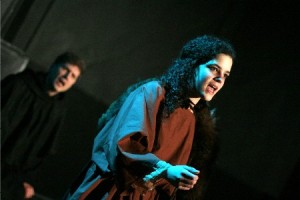Theater Review: GAN-e-meed’s SILENCE is Golden
By Peter-Adrian Cohen
I won’t even try to tell you what the play was all about—I don’t think I fully understood myself. But I can tell you this much: the play works; it gives the actors a number of situations rich in meaning and emotion to explore. And explore they do.
Silence by Moira Buffini. Directed by SerahRose Roth. Staged by the GAN-e-meed Theatre Project at the Elizabeth Peabody House, 277 Broadway, Somerville, MA, through December 18.
It is one of the pleasures of panning for theatrical gold off the beaten path that, every once in a while, I come up with a true nugget. Such a nugget is Silence produced by GAN-e-meed, a small theatrical company that is staging the work in Somerville, MA.
To be honest, I did not think it would be that kind of evening at first. From the moment I got near the theater—a former church—everything seemed to suggest that the experience could not possibly turn out well. To begin with, there was the location—the Winter Hill neighborhood of Somerville. A strange no-man’s land, especially at night, of tangled asphalt-veins and giant intersections; a raw, struggling part of the city. And then there was the theater itself—the church, or rather its upstairs, a black box maintained on a shoe-string.
All that changed when the lights went down. With every minute the play progressed, the place, the evening, and the audience became transformed. And I became part of an evening of gripping theater. I won’t even try to tell you what the play was all about—I don’t think I fully understood myself. But I can tell you this much: the play works; it gives the actors a number of situations rich in meaning and emotion to explore. And explore they do.
The plot is a gender-bender with multiple cases of mistaken sexual identity: the boy is really a girl, the girl actually a man. And though the action ends a la Hamlet—with bodies strewn all over the stage—I am not sure playwright Moira Buffini (a Brit who was awarded the Susan Smith Blackburn Prize for this play, as best English-language play by a woman in 1999) intends true tragedy. In fact, the construction of the play—something akin to a Swiss cuckoo clock—invites all kinds of interpretations.

Marc Harpin (Roger), Scott Sweatt (Ethelred), Terrence Haddad (Eadric) — The performances of these urban stage-warriors make the evening. Photo: SerahRose Roth
SerahRose Roth, the play’s director, serves up the story as a tragic-comic absurdity. In a sense, the highest compliment to her is that you don’t notice her work; the play just seems to happen—spontaneously, surprisingly. The effective lighting design helps. There are two memorable scenes, both featuring Scott Sweatt as King Ethelred, where the stage is reduced to a single light, a single color: red, in one case, and a blueish white in the other. In these scenes the combination of light and the actor’s talent create memorable moments of beauty and intensity. The costumes are also skillfully designed; they do their part to keep the play suspended between absurdity and beauty.
Which all leads me back to what REALLY makes this evening: good and, in a couple of instances, very good acting. There are Roger, the nerdy priest (Marc Harpin), who creates tiny moments of insanity; the emotional Ymma and Eadric (Erin Scanlon; Terrence P. Haddad); and the especially noticeable, young Lord Silence (Madeline Schulman). I could not believe that Ms. Schulman is only a high school senior; she already radiates a strong stage presence.
But the standout, no question, is Scott Sweatt’s King Ethelred. Mr. Scott has the range and craft of an actor twice his age; he uses vocal nuance nimbly, bouncing from a whisper to silence and then up to a roaring tenor. Here is an unusual talent.
To see him, see this gifted group of actors—go and take in Silence! Strange as the venue and location at first may seem, it’s all reassuringly of one piece: a credible set for this troupe of young, gifted, urban stage-warriors.

